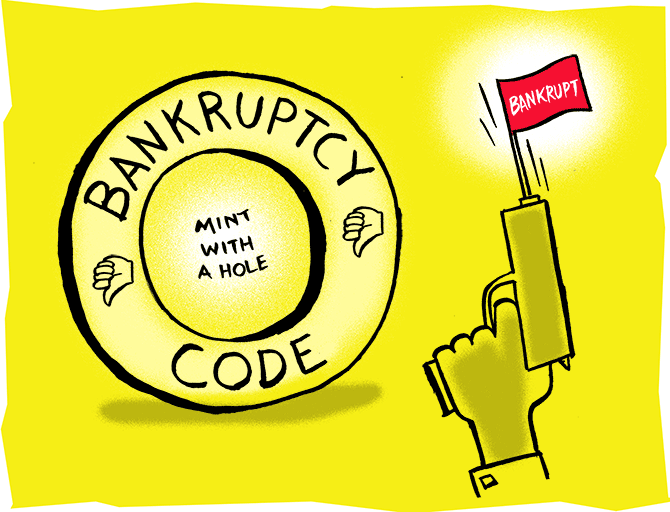The amendments give committee of creditors of a loan defaulting company explicit authority over the distribution of proceeds in the resolution process and fixes a firm timeline of 330 days for resolving cases referred to the IBC.
Illustration: Dominic Xavier/Rediff.com

The Rajya Sabha on Monday approved amending the three-year-old Insolvency and Bankruptcy Code (IBC), providing clarity about preference to secured lenders over operational creditors and giving lenders explicit authority over distribution of proceeds of auction of loan defaulting companies.
Replying to a debate on the Insolvency and Bankruptcy Code (Amendment) Bill 2019, Finance Minister Nirmala Sitharaman said the changes being brought in now are in response to events that eroded legislative intent of the IBC.
She referred to the Essar Steel insolvency case where the lenders and operational creditors have been treated at par by the bankruptcy court for distribution of auction proceeds.
The amendments give committee of creditors of a loan defaulting company explicit authority over the distribution of proceeds in the resolution process and fixes a firm timeline of 330 days for resolving cases referred to the IBC.
These are in response to "newer challenges coming up," she said adding the government speedily came up with the amendments in response to the developing situation.
The National Company Law Appellate Tribunal (NCLAT) had recently ruled in the Essar Steel Ltd's case that the Committee of Creditors (CoC) had no role in distribution of claims and brought lenders (financial creditors) and vendors (operational creditors) on a par.
The government is amending IBC as "very serious interpretative problems were coming," she said referring to the Essar Steel insolvency case.
The amendment now equates distribution of amounts under a resolution plan with the manner it's allowed in case of liquidation, maintaining the hierarchy of lenders.
The change will be retrospective, making it applicable for ongoing cases.
She quoted Supreme Court judgement to say that defaulters’ paradise is lost through IBC.
Amendments are ‘clarificatory’ in nature and the "intent of the government is maximisation of value while simultaneously adhering to strict timelines," she said.
Sitharaman said some of 12 big loan defaulting companies have been pending for more than 600 days since the insolvency proceedings started.
Financial creditors are on average getting 43 per cent of dues as against getting nothing if defaulting companies were never taken up under IBC, she said.
Stating that the spirit behind the IBC is that money not being forgotten, assets are not forgotten and workers are not forgotten, she said defaulting companies have been revived after insolvency proceedings.
On questions on any bidders not carrying out the resolution plan, she said criminal prosecution is possible in such cases.
The government will not make any further claim after resolution plan is approved, she said in response of the successful bidder having indemnity.
Also, there will be no criminal cases against successful bidder for fraud by previous promoters.











 © 2025
© 2025